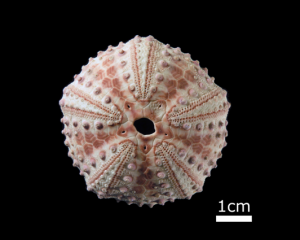Erwan Courville PhD thesis
 Integrative analysis of extant and fossil data, morphological and molecular, to study the ecological and biogeographical evolution of the genus Arbacia Gray, 1835 (Echinoidea) during the Cenozoic
Integrative analysis of extant and fossil data, morphological and molecular, to study the ecological and biogeographical evolution of the genus Arbacia Gray, 1835 (Echinoidea) during the Cenozoic
Started in october 2021
Funding: doctoral grant
Supervisors: Thomas Saucède (uB) and Elie Poulin (Chili university)
Defense the 17 december 2024
Abstract
This PhD thesis examines the role of ecological and historical factors in the biogeographical distribution of the echinoid genus Arbacia (Echinoidea, Arbacioida). The project is structured into three parts. First, the taxonomic revision of the genus revealed a higher level of morphological diversity than expected, with the discovery of seven new fossil species. Then, phylogenetic analyses based on molecular markers were performed to resolve the relationships among extant species and showed an ancient divergence between Atlantic and Pacific species predating the formation of the Isthmus of Panama. An integrated phylogeny was constructed combining morphological and molecular data, with both extant and fossil species, highlighting a complex evolutionary history. Finally, biogeographical analyses were performed that showed that dispersal events have played a key role in Arbacia evolutionary history, with recurrent speciation events due to dispersal from temperate regions to tropical zones, especially along the Californian coasts and in the Caribbean. Several duplication events were also highlighted suggesting a role played by sympatric speciation. Ecological niche modeling of both extant and fossil species are clues to set hypotheses about the part played by ecological factors in the genus evolution. Contrary to a paradigm of the tropics as centers of origin for marine biodiversity, Ph.D. results show that Arbacia likely diversified in the temperate Northeast Pacific then dispersed toward tropical regions.
Keywords
biogeography, marine ecology, modelling, paleontology, Echinoidea, Cenozoïc
Thesis advisory panel
Gilles Escarguel (université de Lyon Paul Bernard)
Rémi Wattier (uB)
Jury
Loic Villier, Sorbonne Université – reviewer
Nadia Améziane, Muséum national d’histoire naturelle de Paris – reviewer
David Véliz, Universidad de Chile – examiner
Marie-Laure Guillemin, Universidad Austral de Chile – examiner
Karin Gerard, Universidad de Magallanes – examiner
Arnaud Brayard, CNRS – examiner
Thomas Saucède, université de Bourgogne – supervisor
Elie Poulin, Universidad de Chile – cosupervisor
- extrait:
- lien_externe:
- titre:
- Analyse intégrée de données fossiles et actuelles, morphologiques et moléculaires pour comprendre l'évolution écologique et biogéographique du genre Arbacia Gray, 1835 (Echinoidea) au cours du Cénozoïque
- date_de_debut_these:
- octobre 2021
- nom:
- Courville
- date_de_debut_these_numerique:
- 202110
- kc_data:
- a:8:{i:0;s:0:"";s:4:"mode";s:0:"";s:3:"css";s:0:"";s:9:"max_width";s:0:"";s:7:"classes";s:0:"";s:9:"thumbnail";s:0:"";s:9:"collapsed";s:0:"";s:9:"optimized";s:0:"";}
- kc_raw_content:
 Integrative analysis of extant and fossil data, morphological and molecular, to study the ecological and biogeographical evolution of the genus Arbacia Gray, 1835 (Echinoidea) during the Cenozoic
Integrative analysis of extant and fossil data, morphological and molecular, to study the ecological and biogeographical evolution of the genus Arbacia Gray, 1835 (Echinoidea) during the CenozoicStarted in october 2021
Funding: doctoral grant
Supervisors: Thomas Saucède (uB) and Elie Poulin (Chili university)
Defense the 17 december 2024
Abstract
This PhD thesis examines the role of ecological and historical factors in the biogeographical distribution of the echinoid genus Arbacia (Echinoidea, Arbacioida). The project is structured into three parts. First, the taxonomic revision of the genus revealed a higher level of morphological diversity than expected, with the discovery of seven new fossil species. Then, phylogenetic analyses based on molecular markers were performed to resolve the relationships among extant species and showed an ancient divergence between Atlantic and Pacific species predating the formation of the Isthmus of Panama. An integrated phylogeny was constructed combining morphological and molecular data, with both extant and fossil species, highlighting a complex evolutionary history. Finally, biogeographical analyses were performed that showed that dispersal events have played a key role in Arbacia evolutionary history, with recurrent speciation events due to dispersal from temperate regions to tropical zones, especially along the Californian coasts and in the Caribbean. Several duplication events were also highlighted suggesting a role played by sympatric speciation. Ecological niche modeling of both extant and fossil species are clues to set hypotheses about the part played by ecological factors in the genus evolution. Contrary to a paradigm of the tropics as centers of origin for marine biodiversity, Ph.D. results show that Arbacia likely diversified in the temperate Northeast Pacific then dispersed toward tropical regions.
Keywords
biogeography, marine ecology, modelling, paleontology, Echinoidea, Cenozoïc
Thesis advisory panel
Gilles Escarguel (université de Lyon Paul Bernard)
Rémi Wattier (uB)Jury
Loic Villier, Sorbonne Université - reviewer
Nadia Améziane, Muséum national d’histoire naturelle de Paris - reviewer
David Véliz, Universidad de Chile - examiner
Marie-Laure Guillemin, Universidad Austral de Chile - examiner
Karin Gerard, Universidad de Magallanes - examiner
Arnaud Brayard, CNRS - examiner
Thomas Saucède, université de Bourgogne - supervisor
Elie Poulin, Universidad de Chile - cosupervisor
